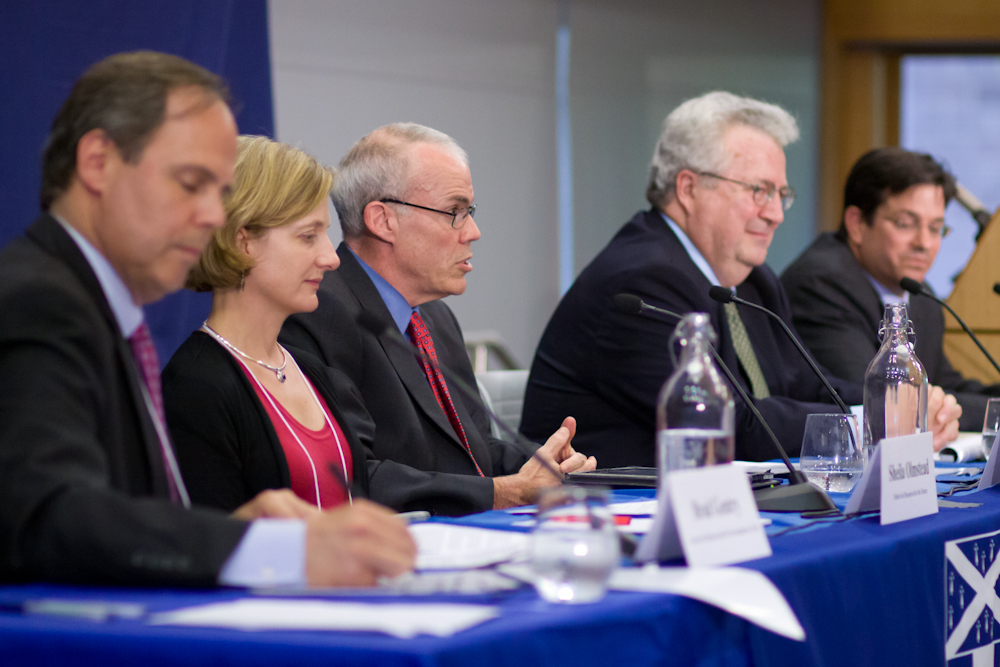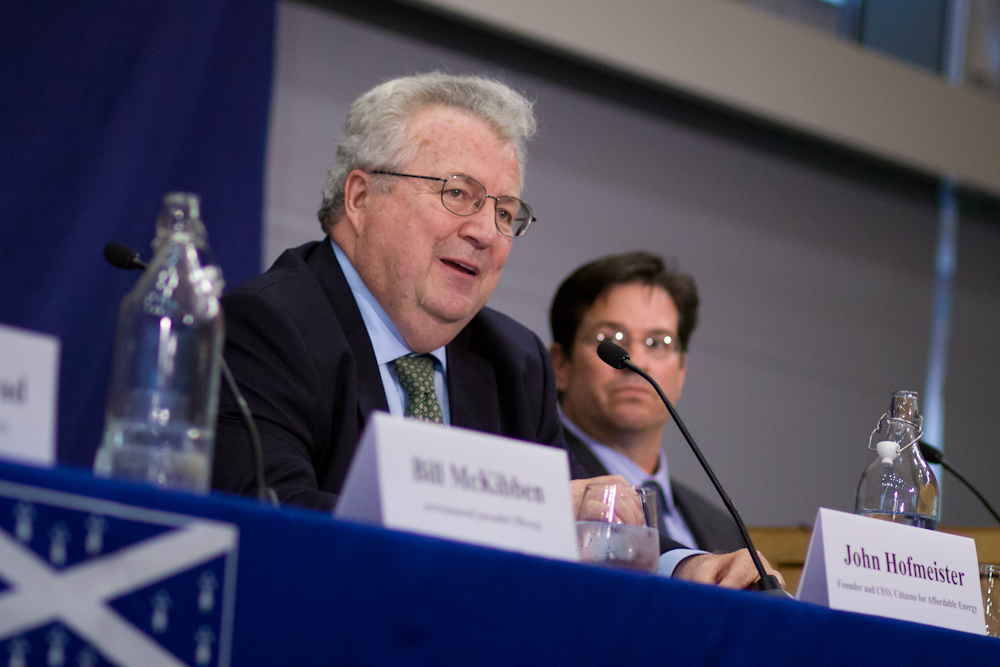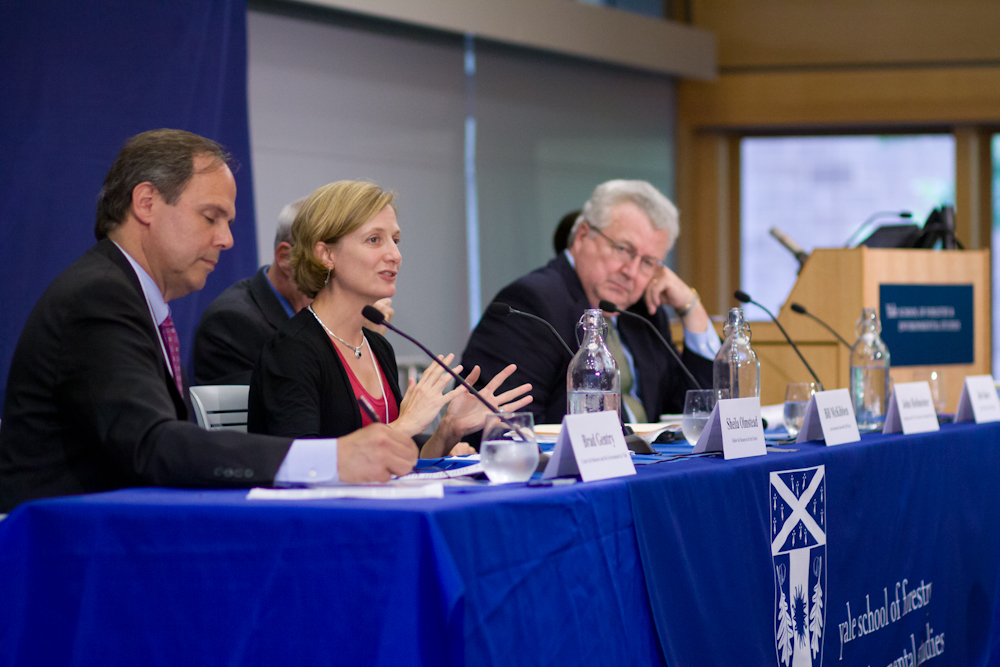Ed. note: For further fracking coverage, check out our article Solutions from the Gas Field, which details five ways to make fracking safer, and our interview series The Frontlines of Fracking.

As nearby New York State’s moratorium on hydraulic fracturing entered its terminal stages, the Yale School of Forestry and Environmental Studies brought together a panel of four leading thinkers to discuss this complex and divisive process of energy extraction in a public forum.
None of the 200 spectators crammed into Burke Auditorium, nor the hundreds more watching via livestream, expected solutions. But with some big-ticket scientists and activists in the house, there was an unmistakable buzz of anticipation— of controversy, big ideas, and some theater. Though not explicitly framed as a commentary on New York policy, the debate raging only 130 miles away in Albany loomed over the conversation.
On paper, the main event was the pitting of Bill McKibben, America’s leading climate change activist and the founder of 350.org, against John Hofmeister, the former CEO of Shell Oil and current chief executive of Citizens for Affordable Energy, an energy-security advocacy group with an all-options-on-the table approach. To shade in some of the philosophical space between the two heavyweights, the panel was rounded out by a pair of experts credentialed to speak about the social and scientific effects that fracking sites have on the people and environments that surround them. Sheila Olmstead, a fellow at Resources for the Future, was there to shed light on the effects of fracking on the social fabric of proximate towns. To address the science behind hydraulic fracturing, the school called upon its own Professor James E. Saiers, a hydrologist who has done extensive work on and near fracking sites.
Moderator Brad Gentry began by asking each panelist whether they considered shale gas a “bridge to a clean energy future,” a nod to the title of the event. Saiers and Olmstead spoke first, both outlining the positions they would maintain for the rest of the panel: Fracking has its pros and cons; fracking is happening and rapidly developing; fracking affects communities adversely. While we do not know enough to make any definitive claims, we must be sure to minimize social and environmental harm. In short: bad things happen near fracking sites. However neither scientist was willing to take a stronger line than “the data is inconclusive.”

Unlike the academics, Hofmeister pulled no punches when it was his turn to speak. “Is natural gas a bridge?” he asked huskily, leaning into the mic. “I think it’s a highway.” He went on to say that though a frack site is undoubtedly a dirty place, it represents the best of human ingenuity, likening the process to the two very different procedures of making hamburgers and conducting heart surgery.
McKibben spoke last, and wasted little time in staking out his position with the afternoon’s best turn of phrase. “Hydro-fracking is not a highway to the future,” he declared, warning of methane leakage and the potential of cheap gas investment to undercut renewable energy. “Hydro-fracking is a rickety pier out into the lake of hydrocarbons.”
From there, the panel entered a kind of tunnel, or rather a strange dance. With Hofmeister and McKibben sitting squarely on the poles, Olmstead and Saiers repeatedly followed their research toward McKibben’s position, before claiming that “the data is inconclusive” and backpedaling toward Hofmeister’s. Asked to give a recommendation based on the findings of his own research, Saiers demurred, offering a prediction instead. New York would lift its moratorium, he offered, noting that shale gas development had clear support from the Obama administration. As long as research into environmental impacts lagged behind the pace of development, scientists would forever be stuck reacting to industry’s moves.
To McKibben’s mind, this passivity is a commonplace of science, and an unacceptable one. Simply shrugging off the growth of fracking as inevitable, he said, is plainly a concession to power. What’s needed instead is a large-scale social movement to challenge the fossil fuel industry.
The portrayal of the fossil fuel industry as some sort of sinister monolith clearly frustrated Hofmeister, who drew a convoluted parallel between the ills of the energy industry and crime. “Why do we have so many prisoners in prison?” he asked. “Because they break the laws. It’s the same with energy companies.” That there are a few bad apples doesn’t discount the fact that energy companies supply a product to the consumers who demand it. He, for one, was proud of Exxon and Chevron and Shell, for voluntarily signing up for standards and pursuing environmental health beyond what the standards require of them.
Indeed, Hofmeister spent much of the evening defending the souls of energy companies, with mixed results. His assertion that he opposes all private campaign donations, and believes in public funding for elections, drew the panel’s biggest applause. On the other hand, his claim that Shell contributed nothing to political campaigns was neatly undercut by McKibben, who pointed out that Shell is a member of the U.S. Chamber of Commerce— the country’s largest lobbying group.
When McKibben’s lofty rhetoric and Hofmeister’s inelegant analogies threatened to pull the conversation too far afield, Olmstead reliably returned it to a germane topic: the effects of fracking on the communities in which it occurs. Her extensive research on that subject has revealed several common spheres of potential impacts, including surface water, groundwater, air quality, and habitat fragmentation. While admitting that this was an incomplete list, it at least provided a place to start looking for ill effects. What Olmstead’s list couldn’t speak to, however, is what to do next.

The night’s real point of curiosity might not have been whether fracking is a bridge to anything, but a more fundamental question: how we talk about the pressing and complex issues that structure our political landscape. Fracking is contentious because it cuts across so many lines—geography, politics, the environment, public health, and class, to name a few. Debating it thoroughly for a mere hour and a half is a formidable task, one that may obscure what is broken about the whole endeavor.
McKibben’s main point was that we have sixteen years to change our ways before catastrophic warming becomes irreversible, while Hofmeister’s thesis was that it is unrealistic to move away from fossil fuels in the next three or four decades –– reason enough, he said, to cast our lot with natural gas. For their part, the scientists claimed that we do not yet have enough data to understand fracking’s effects,
In a democracy, all is well when intellectual contestants battle to win the hearts of free citizens. But up for consideration on Tuesday was not really the future of our energy systems, but rather the future of how we talk about energy in this country. If we permit the substance of our debates to exist at the poles, while experts carefully—fastidiously—insist we do not know enough, then the debate necessarily favors those who do not believe that time is of the essence. By the time we achieve full certainty about the science of fracking, the sixteen-year threshold will have come and gone, and the planet, as McKibben asserts, will be toast. We pretend to hold a debate, while in reality we have admitted that it’s already over. The language of the debate itself favors the status quo.
With less than ten minutes to go, Gentry admitted one question from the audience, a query about what the shale gas controversy tells us about power, politics, and the capacity of science to influence them. McKibben asked the audience to consider the transformation of the Arctic: in twenty-five years, we have utterly disfigured one of the greatest geological structures of our planet, yet we have barely taken pause. Hofmeister returned to his insistence that consumer education is essential, and that answers lie in technologies like clean coal and fracking, suggesting an inevitability to the perpetuation of fossil fuels. Olmstead insisted that public expenditures on natural gas exploration need to be matched by public investment in impact assessment and research.
And Saiers drew the audience’s attention to New York State, where his work, and the work of his fellow scientists, had staved off extraction for as long as it could.
“Science has a role,” he said, “but science isn’t ruling the day.”
He probably didn’t realize at the time how apt his declaration was.